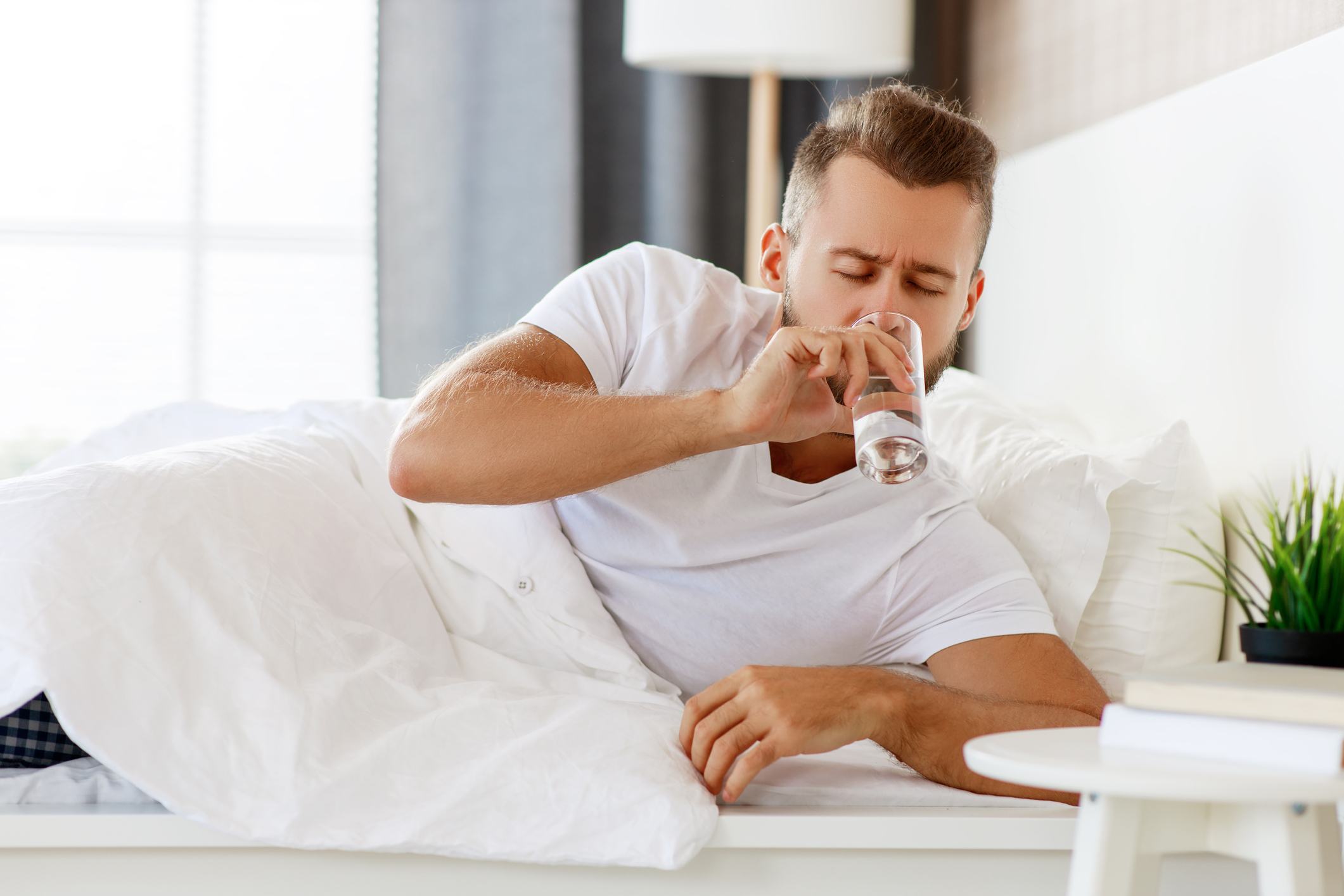Should You Drink Water Before Bed? Here are the Pros and Cons

Water accounts for up to 60% of body weight, and losing 10% or more of body water can have severe health consequences. It may sound obvious, but we humans can’t survive without adequate water intake, as it’s an essential nutrient that supports bodily functions which keep our bodies performing as they’re meant to. Maintaining proper hydration can also help improve physical, cognitive, emotional, and sleep health.
If you’re a regular water drinker, you may wonder if it’s beneficial to add “drink a glass of water” into your nighttime wind-down routine. Or maybe you’re looking for more simple ways to get a better night’s rest, and you’ve heard that drinking water might help. Should everyone drink water before bed? Let’s look at the pros and cons of drinking water before bed and if the benefits outweigh the downsides.
Pros of drinking water before bed
1. Lowers blood pressure and heart rate
An article published in Scientific Reports suggests that water reduces cardiac workload with a noticeable effect on heart rate and blood pressure. It further indicated that the decrease in blood pressure and heart rate might be partly due to the activation of the parasympathetic nervous system, the body’s rest, digest, and recovery state.
Similarly, a 2020 study suggests that drinking water habitually before bedtime may reduce blood pressure.
Water helps the heart pump blood more efficiently, as it may prevent strain on the heart, blood pressure, and heart rate. When a person’s heart rate and blood pressure are lower, they’re better able to de-stress and relax, which helps with falling asleep faster and staying asleep.
2. Improves mood
After a long day at work, it may be unlikely that you’ll get home in the brightest mood. Apart from the day’s stressors weighing on you, your mind may be preoccupied with what you need to do the next day. These may affect your mood and disturb your nighttime rest.
The good news is that research suggests that hydration may improve mood, calmness, feelings of satisfaction and produce other positive emotions, which may help create the right atmosphere for a peaceful night’s rest.
Other studies also show that dehydration may lead to poor mood, irritability, difficulty concentrating, restlessness, daytime sleepiness, and fatigue, all of which may hinder sleep.
3. Relieves headache symptoms
Sometimes, falling asleep may be difficult because of a lingering headache. If this is you, then taking a glass of water before bedtime may be the remedy for relieving your symptoms.
According to the Journal, Nutrition Reviews, strong evidence suggests that drinking water may help relieve some forms of headache. Similarly, a 2020 study found that drinking water may help reduce headache symptoms, severity, and duration.
Another study recommended that people who experience headaches increase their water intake as a potential remedy for managing their symptoms.
4. Prevents dehydration
Dehydration occurs when the body loses more water than it replenishes. A person will enter a dehydrated state when they lose 2% or more of their water body content.
When dehydrated, a person may experience thirst, dry mouth, lips, and eyes, increased heart rate and body temperature, poor mood, muscle cramps, and irritability. These symptoms may impact a person’s ability to fall and sleep and get uninterrupted sleep.

Drinking a glass of water before bed is a way to rehydrate the body and help you sleep better at night.
Cons of drinking water before bed
With all the advantages of staying hydrated, should you think twice before grabbing that extra glass of H20 before bedtime?
Interestingly, here’s one reason why drinking too much water before bed may not be ideal when it comes to getting uninterrupted sleep.
When you drink a lot of water before bedtime, you may have to get up at night to visit the restroom, causing an unnecessary interruption in your sleep. And there’s no guarantee that you may fall right back asleep.
When a person goes to the bathroom overnight two or more times, they may be experiencing what is known as nocturia – a condition in which you wake up to use the bathroom to urinate several times per night. This condition can stem from other underlying health issues, or simply being too well hydrated! Nocturia occurs in 50 million US adults, with research showing that it affects 2% to 18% of people ages 20 to 40. Its prevalence increases with age as it affects 28% to 62% of people between 70 to 80 years.
Research suggests that nocturia increases a person’s risk of developing insomnia. Nocturia also leads to fragmented sleep, impacting a person’s ability to get proper recovery sleep.
Drinking too much water at nighttime may contribute to nocturia. Other associated conditions include bladder overactivity, bladder infection, diabetes, obesity, high blood pressure, heart disease, and sleep disorders like obstructive sleep apnea and insomnia.
If you frequently urinate at night, consider speaking with a doctor who may best prescribe appropriate treatment and screen for and treat any underlying conditions responsible for it.
Here are some lifestyle recommendations from an article published in the International Journal of Clinical Practice that may help prevent urination or reduce urination frequency at night
- Limit water intake in the two hours leading up to bedtime and manage your caffeine and alcohol consumption throughout the evening.
- Try to use the restroom one last time right before going to bed.
- Reduce the amount of salt in your daily diet.
- Increase your daily physical activity levels, and you may also include pelvic floor exercises.
Keeping sufficiently hydrated during the day may improve sleep health, and there’s evidence that suggests that the longer your sleep duration is, the less dehydrated you may be. Therefore, hydration likely benefits sleep, which, in turn, may support optimal hydration.